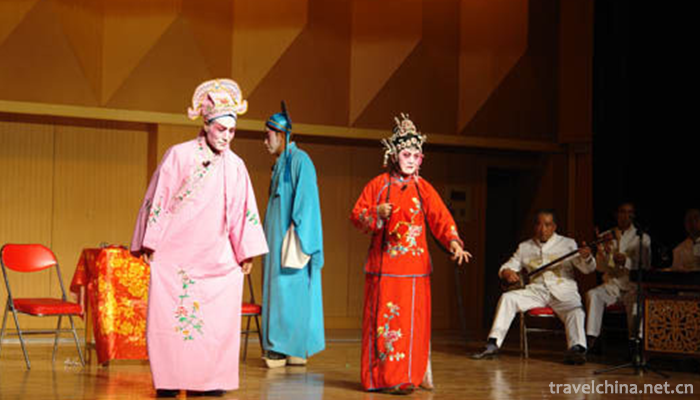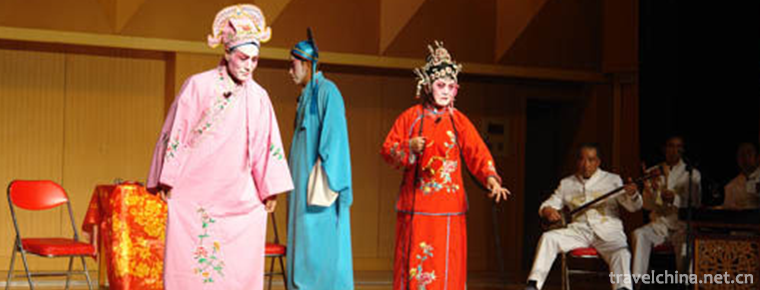Tongwei Opera
Tongwei Opera
Tongwei Xiaoqu Opera is a kind of traditional Xiaoqu Opera popular in Tongwei County. In the Ming and Qing Dynasties, Tongwei folk artists absorbed various flavors of Longdong Daoqing, Wanwanwanqiang and folk songs on the basis of Shaanxi, Gansu, Ningxia and Qinghai folk songs, and continuously enriched and developed them. The local flavor is strong, the script story is simple and easy to understand, which embodies the people's simple and kind, loyal and honest human nature characteristics and the persistent spirit of pursuing good love between men and women.
In 2011, it was selected as the third batch of national intangible cultural heritage list.
Inheritance Significance
People's Daily once criticized that flute music creation is too original nowadays. Some composers and performers pursue novelty, novelty and novelty blindly and deviate from the life of the general public. They cited two examples of "Pushing the Whip to Urge Horses to Transport Food Busily" and "New Pastoral Song", saying that nowadays no flute can surpass these two works. Why is that? I think today's composers and performers are all above the high level, earn extra money with high wages, enjoy the convenience and speed of metropolis life, and take the western music theory and technique as their own "Bible", who can really go deep into the folk to absorb the nourishment of folk music and traditional music, this is the essence and essence of our music culture. "Pushing the Whip to Urge Horses to Transport Grain Busy" is based on the Northeast music "Herdsmen's New Song" from the Mongolian people, in addition, there are numerous similar examples. Throughout those works with long-term artistic vitality and influence, all of them are permeated with folk music materials from the masses.
Finally, we think that folk songs like Tongwei Xiaoqu have their own value and significance. We must attach importance to it, study it and use it to serve our research and music creation.


-
1.Beijing Roast DuckPeking duck
Roast duck is a world-renowned Beijing dish, which originated in the Northern and Southern Dynasties of China. It has been recorded in the Record of Food Treasures and was a palace food at that time.P
Time 2018-10-27 -
2.The Wudalianchi Scenic Area
Wudalianchi Scenic Spot: National AAAAA Scenic Spot, World Geological Park, World Human and Biosphere Reserve, International Green List
Time 2018-12-05 -
3.Shanghai Baoshan International Folk Art Exhibition Hall
Shanghai Baoshan International Folk Art Exhibition Hall is the first exhibition, research and protection of intangible cultural heritage in Shanghai constructed by Shanghai University in cooperation w
Time 2018-12-19 -
4.Beijing silk flower
Beijing silk flower, one of the traditional handicraft products in Beijing, also known as "Beijing flower", originated in Shenmuchang Street outside Chongwenmen in Ming Dynasty
Time 2019-04-04 -
5.Batik art
Miao batik technology, the traditional handicraft of Danzhai County, Guizhou Province, is one of the national intangible cultural heritage.
Time 2019-05-10 -
6.Music dance
Musical dance is popular on the South Bank of the Red River, so it is also known as "Jiangwai" Yi dance. The Yi language is called "Zai Bi", which means jumping up in pairs.
Time 2019-05-11 -
7.Legend of Mencius Mother and Godson
Legend of Meng Mu and Godson, Zoucheng local traditional folk literature, Shandong Province, one of the national intangible cultural heritage.
Time 2019-06-04 -
8.The Miao costumes
Miao is an international ethnic group originating from China. In the 2010 census, Miao is mainly distributed in Guizhou, Hunan, Yunnan, Chongqing, Hubei, Sichuan, Hainan, Guangxi and other provinces (
Time 2019-06-05 -
9.Napo Zhuang Folk Songs
Napo Zhuang, also known as "Heiyizhuang", is a unique ethnic group among the Zhuang people. It calls itself "Min", "Zhong", "Ouch". Now there are about 518,000
Time 2019-06-06 -
10.a kind of Shanxi opera
Shangdang Bangzi is one of the four Bangzi in Shanxi Province. It is popular in the two cities of Shanxi Province, namely, the Minister of southeastern Shanxi Province and Jincheng City (formerly know
Time 2019-06-13 -
11.Flyover wrestling
In the 1930s, when Peiping wrestling was very popular, Peiping wrestling was famous all over the country. At that time, the strongest wrestling master of Peiping overpass was Shen San (Shen Yousan), B
Time 2019-06-21 -
12.Administrative division of GuanganTime 2020-12-19